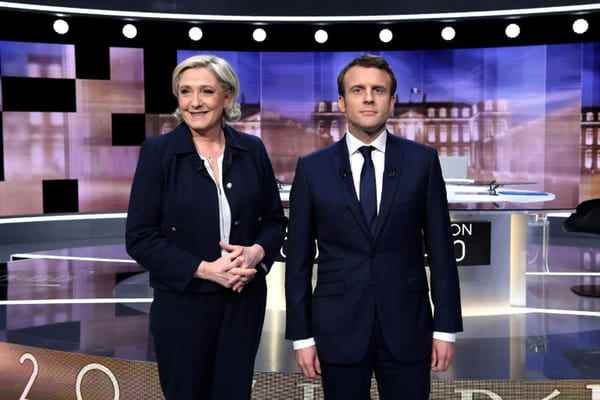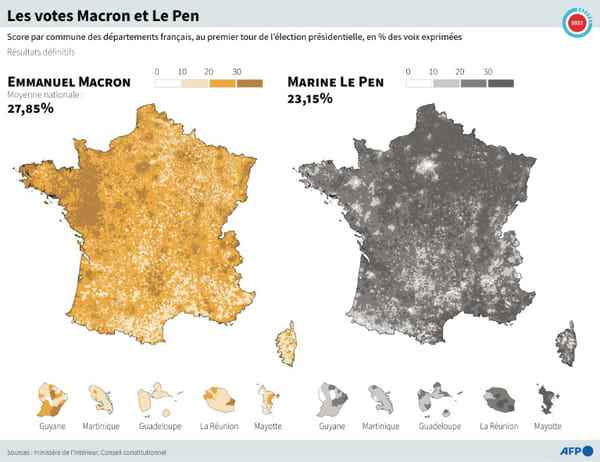It’s time for the return match: five years later, Emmanuel Macron and Marine Le Pen meet on Wednesday evening for the unmissable duel of the presidential election. But with a tighter gap than in 2017.
The exercise does not usually upset the dynamics of voting intentions.
But this time, this debate could remobilize certain electorates and “move more voices than what we have observed since the beginning of the Fifth Republic”, according to Brice Teinturier, deputy general manager of Ipsos France.
Four days before the second round, the polls invariably give the advantage to the outgoing president, with 54 to 56.5% of the voting intentions against 43.5 to 46% for Marine Le Pen. That is a difference of 8 to 12 points, when Emmanuel Macron won in 2017 with a lead of 32 points (66% of the votes cast against 34% for Ms. Le Pen).

Marine Le Pen and Emmanuel Macron on May 3, 2017 before the televised debate between the two rounds of the presidential election
© POOL – Eric Feferberg
But a possible strong abstention could scramble the game on Sunday. And the two camps gave Wednesday morning a taste of the battle at the top to come.
– “Everything and its opposite” –
During the debate, Emmanuel Macron “will insist on the inconsistencies of Marine Le Pen, who nevertheless said everything and her opposite on everything in five years, and particularly on geopolitical, strategic subjects”, assured the Minister Delegate for Transport Jean -Baptiste Djebbari, citing Ukraine and Russian President Vladimir Putin.
“Systematically changing your mind on all subjects (…), at the very least it is a lack of clairvoyance, at the most it is substantial proof of incompetence”, he said on Radio J.
The two candidates differ on almost everything: from pensions to ecology via the wearing of the veil, public freedoms and institutions, purchasing power, the European Union and international diplomacy, relations with Russia.
Attempting to broaden their electoral base, they have also amended some of their flagship proposals: the ban on wearing the veil in public space is no longer the priority for Marine Le Pen, retirement would be increased to 64 instead of 65 initially proposed for Emmanuel Macron, who also promised, in a gesture to environmental voters, a Prime Minister “directly in charge of ecological planning”.
The outgoing president’s “weak point” “and perhaps also his strong point is never to doubt himself,” said RN President Jordan Bardella on France 2.

Students pose near paintings by Emmanuel Macron and Marine Le Pen at an art school in Bombay on April 19, 2022.
© AFP – Punish PARANJPE
While the “real strong point” of Marine Le Pen, according to him, “is to talk about people’s daily lives”. The defense of purchasing power has been placed at the heart of the campaign of the far-right candidate.
– “Values of the right” –
“There is no stress but a little apprehension because we know that many French people will decide on this debate”, he added.
For Ms. Le Pen, who took refuge at home on Tuesday, it is a question of making people forget the failure of the 2017 debate, the “biggest” of her political career, during which she appeared tired and ill-prepared.
Unlike 2017, Emmanuel Macron presents himself this time with an outgoing president’s record to defend and will be attacked by his competitor on his supposed “contempt” and “arrogance” towards the French.
But he will also try to push her to her limits concerning her program, and to unravel the smoothed image of the one who remains in his eyes “the heiress” of the Le Pen “clan”.
Marion Maréchal and Guillaume Peltier, vice-presidents of the Reconquest party! of Eric Zemmour, for their part called on Marine Le Pen to “not forget the values of the right” in the face of those of the left privileged to attract the voters of Jean-Luc Mélenchon.
After many negotiations and draws, it is finally the purchasing power that will open this debate lasting 2:30. Marine le Pen, placed on the right of the screen, will speak first and last, indicated TF1 and France 2.
In addition to purchasing power, each of the topics covered – security, youth, international, competitiveness, environment, social model, governance – will have “a given time” to speak.
After much discussion, there will also be “listening shots” (where we see the candidate listening to whoever calls out to him). In 2017, these plans had disadvantaged Marine Le Pen, showing her in particular drowned in her files.
The Insoumis leader, who won nearly 22% of the vote in the first round, has already stepped over Sunday’s result.
He called on Tuesday evening to elect him “Prime Minister” during the June legislative elections, giving a majority to his left camp to impose cohabitation on Marine Le Pen or Emmanuel Macron.
All rights of reproduction and representation reserved. © (2022) Agence France-Presse


